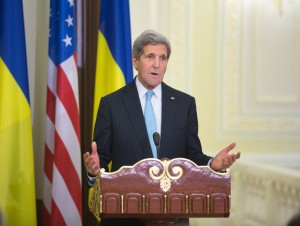Rules Are for Schmucks: What Would a Secular Foreign Policy Look Like?

The most badly bungled episode in American foreign policy since the Vietnam War has been our fumble of the opportunity presented by the “Arab Spring.” For a brief moment, there was a real chance for permanent, positive change in a part of the world that could sorely use it—a chance to move toward a democratic, pluralist, downright humanist ordering of society. Instead, we wound up with ISIS. This resulted, in my unprovable view, from the administration’s obsession with cozying up to religion, and to Islam in particular, as a cynical political strategy.
What if we tried something completely different? What if we tried a principled, consciously secular foreign policy, recognizing that the single biggest factor undermining world peace today is the failure to separate church and state? What would a secular foreign policy look like?
Back Secular Governments
Tunisia should be the centerpiece of our new posture. That’s where the Arab Spring got started, and that’s where voters have installed a progressive, secular government. As last week’s massacre demonstrates, they need our help. President Obama should personally fly to Tunis, back the government there to the hilt, and spend a few days helping to promote Tunisia’s battered tourism industry. We also need to go all out to support the secular side in the civil war now raging in Libya, both militarily and economically. When we stop funding our enemies, as described below, we’ll have plenty of money to give our new friends.
Unfriend Israel and Pakistan
The billions of dollars of aid we’ve wasted on these two countries have bought us nothing but trouble. Cutting off both at the same time would send a clear message: we’re not against Muslims, we’re not against Jews, but we are against theocratic regimes, especially when they foster religion-based violence. As amply documented in the work of the International Humanist and Ethical Union, Pakistan with its blasphemy law is among the worst human rights abusers on the planet. Israel is no democracy, any more than South Africa was before the end of apartheid. One-third of the adults in territories controlled by the Israeli government are not allowed to vote because they are not Jews. If there were real democracy in Israel, Netanyahu would be an afterthought, not a prime minister. If there is one positive result from the last election, it should be the end of the “two-state solution” nonsense. There needs to be one state, with all the religion squeezed out of it—then there will be no reason for Jews and non-Jews to kill one another.
Crush the Islamic State
Congress needs to quit playing partisan politics and immediately declare war against the Islamic State, wherever it surfaces, including in Nigeria and Libya. Not the over-nuanced version proposed by the administration, but a flat-out, open-ended declaration of war, against the most deserving enemy we’ve had since Hitler and Tojo. Then let the executive and military do their job of figuring out how to win the war in the most cost-effective manner possible.
An Independent, Secular Kurdistan
The Kurds have borne the brunt of the struggle against ISIS so far. For decades, we’ve resisted the call for an independent Kurdish state, largely because our “ally” Turkey was so adamantly against it. Turkey is moving resolutely into the Islamist camp, though, including support for the terrorists in Libya. With friends like Turkey, who needs enemies? We should cut a deal to give full backing to an independent Kurdistan—on the condition that it guarantee complete separation of church and state and full freedom for all varieties of belief and nonbelief.
Get Tougher with Saudi Arabia and India
Those of us who remember the gas lines of the Arab oil embargo of 1974 may be a little reluctant to tick off the Saudis again. But if there were ever an opportunity to chance it, a time of falling oil prices as we’ve recently enjoyed may be the best—especially if we re-open access to oil from Iran. New absurdities pour out of Saudi Arabia at a steady rate—the latest is a demand from its grand mufti that every church serving the 650,000 Christians living in neighboring Kuwait be destroyed. As usual, our government is silent on this, based on some sort of “boys will be boys” attitude toward the Saudis. This needs to end.
President Obama did a good thing when he criticized India’s religious record on his recent visit to New Delhi (comments were carefully deleted from the Indian government’s official video of the event). But we need to do more. For example, India refuses to allow our diplomats who investigate religious freedom issues to visit the country, even though they are freely allowed in other countries with worse records. Maybe we should ban some Indian diplomats from visiting the US until this gets straightened out.
Close the Vatican Embassy
It’s not possible to have a foreign policy based on promoting separation of church and state while at the same time recognizing a church itself as a state. The whole idea of the Vatican City “nation” is ludicrous, and we should abandon it immediately. While we’re at it, we should prevent our banks from doing business, directly or indirectly, with any Vatican-based financial institution.
America is far from perfect. But compared to the rest of the planet, we’ve done a good job of allowing people to worship (or not worship) as they choose in near-total peace and harmony. The reason for that is not because we’re better people, but because we have a First Amendment, and we are, for the most part, serious about carrying it out. There seems little chance that any prominent politician would advocate extending First Amendment principles as a central theme of American foreign policy as described here—and equally little chance that the world will soon begin to experience the religious peace that America has enjoyed since its founding. Why not give a secular foreign policy a chance?
